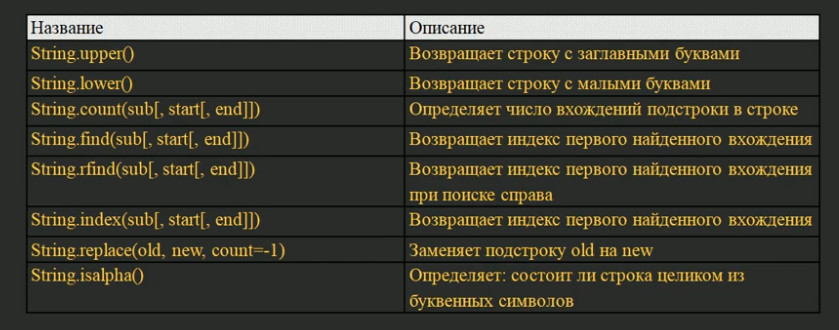In [1]: s = "python"
In [2]: s.upper()
Out[2]: 'PYTHON'
In [3]: s.lower()
Out[3]: 'python'
In [4]: msg = "abrakadabra"
In [5]: msg.count('ra')
Out[5]: 2
In [6]: msg.count('ra', 4, 11)
Out[6]: 1
s.find('smth', start, end) # finds first index that is included. If index isn't find the output will be -1
s.rfind('smth', start, end) # finds string from the end
s.index() # the same as find but it shows error when there is no found element
In [3]: s.replace('py', 'hi')
Out[3]: 'hithon'
In [15]: s.isalpha()
Out[15]: True
In [16]: 'Hi man'.isalpha() # False because there is space between hi and man. space isn't a string
Out[16]: False
In [17]: s.isdigit()
Out[17]: False
In [18]: '6'.isdigit()
Out[18]: True
>>> g
['1', '2', '3', '4']
>>> ', '.join(g)
'1, 2, 3, 4'
In [7]: a = 'Alex Treizer Faura'
In [8]: a
Out[8]: 'Svet Jpp Faura'
In [9]: ", ".join(a.split())
Out[9]: 'Svet, Jpp, Faura'
In [10]: " hello world \n".strip()
Out[10]: 'hello world'
In [11]: " hello world \n".rstrip()
Out[11]: ' hello world'
In [12]: " hello world \n".lstrip()
Out[12]: 'hello world \n'



Reference:
- Kind Python. Sergey Balakiriev